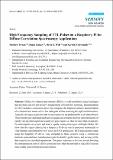| dc.contributor.author | Tivnan, Matthew | |
| dc.contributor.author | Wolf, David | |
| dc.contributor.author | Vishwanath, Karthik | |
| dc.contributor.author | Gurjar, Rajan S. | |
| dc.date.accessioned | 2015-11-03T17:05:42Z | |
| dc.date.available | 2015-11-03T17:05:42Z | |
| dc.date.issued | 2015-08 | |
| dc.date.submitted | 2015-06 | |
| dc.identifier.issn | 1424-8220 | |
| dc.identifier.uri | http://hdl.handle.net/1721.1/99677 | |
| dc.description.abstract | Diffuse Correlation Spectroscopy (DCS) is a well-established optical technique that has been used for non-invasive measurement of blood flow in tissues. Instrumentation for DCS includes a correlation device that computes the temporal intensity autocorrelation of a coherent laser source after it has undergone diffuse scattering through a turbid medium. Typically, the signal acquisition and its autocorrelation are performed by a correlation board. These boards have dedicated hardware to acquire and compute intensity autocorrelations of rapidly varying input signal and usually are quite expensive. Here we show that a Raspberry Pi minicomputer can acquire and store a rapidly varying time-signal with high fidelity. We show that this signal collected by a Raspberry Pi device can be processed numerically to yield intensity autocorrelations well suited for DCS applications. DCS measurements made using the Raspberry Pi device were compared to those acquired using a commercial hardware autocorrelation board to investigate the stability, performance, and accuracy of the data acquired in controlled experiments. This paper represents a first step toward lowering the instrumentation cost of a DCS system and may offer the potential to make DCS become more widely used in biomedical applications. | en_US |
| dc.description.sponsorship | Radiation Monitoring Devices, Inc. | en_US |
| dc.language.iso | en_US | |
| dc.publisher | MDPI AG | en_US |
| dc.relation.isversionof | http://dx.doi.org/10.3390/s150819709 | en_US |
| dc.rights | Creative Commons Attribution | en_US |
| dc.rights.uri | http://creativecommons.org/licenses/by/4.0/ | en_US |
| dc.source | MDPI Publishing | en_US |
| dc.title | High Frequency Sampling of TTL Pulses on a Raspberry Pi for Diffuse Correlation Spectroscopy Applications | en_US |
| dc.type | Article | en_US |
| dc.identifier.citation | Tivnan, Matthew, Rajan Gurjar, David Wolf, and Karthik Vishwanath. “High Frequency Sampling of TTL Pulses on a Raspberry Pi for Diffuse Correlation Spectroscopy Applications.” Sensors 15, no. 8 (August 2015): 19709–19722. | en_US |
| dc.contributor.department | Lincoln Laboratory | en_US |
| dc.contributor.mitauthor | Gurjar, Rajan S. | en_US |
| dc.relation.journal | Sensors | en_US |
| dc.eprint.version | Final published version | en_US |
| dc.type.uri | http://purl.org/eprint/type/JournalArticle | en_US |
| eprint.status | http://purl.org/eprint/status/PeerReviewed | en_US |
| dspace.orderedauthors | Tivnan, Matthew; Gurjar, Rajan; Wolf, David; Vishwanath, Karthik | en_US |
| mit.license | PUBLISHER_CC | en_US |
| mit.metadata.status | Complete | |
